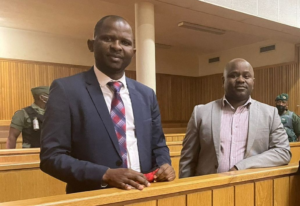“No Justice in a Kingdom of Fear”: PUDEMO Slams Judiciary Under Absolute Monarchy
In the Kingdom of Eswatini, justice is not just blind—it is bound, gagged, and shackled to the throne.
As the nation marks yet another painful anniversary of the 1973 April 12 Decree, the People’s United Democratic Movement (PUDEMO) is once again raising the alarm on the continued erosion of justice and democracy under King Mswati’s absolute rule.
Speaking to SABC’s Channel Africa radio ahead of the commemoration weekend, PUDEMO’s National Organizing Secretary, Siboniso Mkhabela, made it clear: “The judiciary in Eswatini is not independent.”
This is not a sentiment—it’s a reality that millions of Swazis live with every day. The courts, instead of being a sanctuary for justice, have become an extension of royal power—a tool to punish dissent and shield the powerful.
Mkhabela’s words strike deep. He reminded the world that political parties in Eswatini remain banned, five decades after the royal coup that King Sobhuza II executed through the infamous 1973 Decree. In that one declaration, the Constitution was trashed, democratic institutions were dismantled, and all political opposition was criminalized.
And since then, the monarchy has not looked back.
King Mswati inherited this power-hungry legacy and elevated it into something even more sinister. Today, he rules with total control over the Executive, Judiciary, and Legislature. There are no checks and balances. There is no constitutional democracy. There is only the will of one man.
The courts do not serve justice. They serve the crown.
This is why political activists are jailed, tortured, or even murdered for speaking out. This is why human rights defenders are treated like criminals, and actual criminals within the elite circles enjoy immunity.
Mkhabela rightly pointed out that the banning of political parties was never about peace or unity—it was a direct response to the growing popularity and influence of pro-democracy movements. The monarchy feared losing control, so it shut down the political space, silenced opposition, and embedded itself in every arm of power.
The judiciary was captured—not by corruption, but by design.
Ask yourself: in a country where one man appoints judges, controls the police, and dictates laws, how can we speak of justice? In Eswatini, courtrooms have become stages for political theatre, where the verdict is known before the trial begins—especially if you dare to challenge the status quo.
For ordinary Swazis, this means living under a regime where justice is a privilege, not a right. If you are connected to the royal family, you are untouchable. If you are a poor man crying for democracy, you are disposable.
And yet, despite this bleak reality, PUDEMO and other freedom fighters continue to resist. They continue to speak out, even when speaking out can cost them their freedom or their lives.
This is the courage that keeps our hope alive.
As the world watches Eswatini this weekend during the commemoration of the banning of political parties, let the message be clear: we are not mourning—we are mobilizing. We are exposing the truth behind the smiling face of monarchy. We are demanding an end to the lies wrapped in culture and tradition.
The judiciary must be independent. Political parties must be unbanned. Power must be returned to the people.
We will not rest until this nation is free.




The situation in Eswatini highlights the deep-rooted issues of justice and democracy under King Mswati’s rule. The courts, meant to uphold fairness, have become tools of oppression, silencing dissent and protecting the powerful. The 1973 Decree continues to cast a long shadow, as political parties remain banned and democracy is suppressed. It’s alarming how the monarchy has entrenched itself in every aspect of governance. Why has the international community remained so silent on these blatant human rights violations?
The situation in Eswatini is deeply troubling, as it highlights the systematic dismantling of democracy and justice under absolute monarchy. The 1973 Decree continues to cast a long shadow, stifling dissent and entrenching royal authority. Activists and human rights defenders face severe repercussions for simply advocating for democracy, while the elite remain untouchable. It’s alarming to see how the judiciary, supposed to uphold justice, has become a tool of oppression. How can true progress be achieved when the very institutions meant to protect the people are complicit in their oppression?
The situation in Eswatini is deeply concerning, and Mkhabela’s words shed light on years of systemic oppression. It’s heartbreaking to see justice so blatantly manipulated to serve the monarchy rather than the people. The ban on political parties for five decades is not just an attack on democracy but a denial of basic human rights. How can a nation thrive when dissent is criminalized and power is concentrated in the hands of one individual? The lack of checks and balances is a clear violation of what a just society should stand for. What will it take for the international community to step in and hold the monarchy accountable? Isn’t it time for the people of Eswatini to reclaim their voice and demand real change?